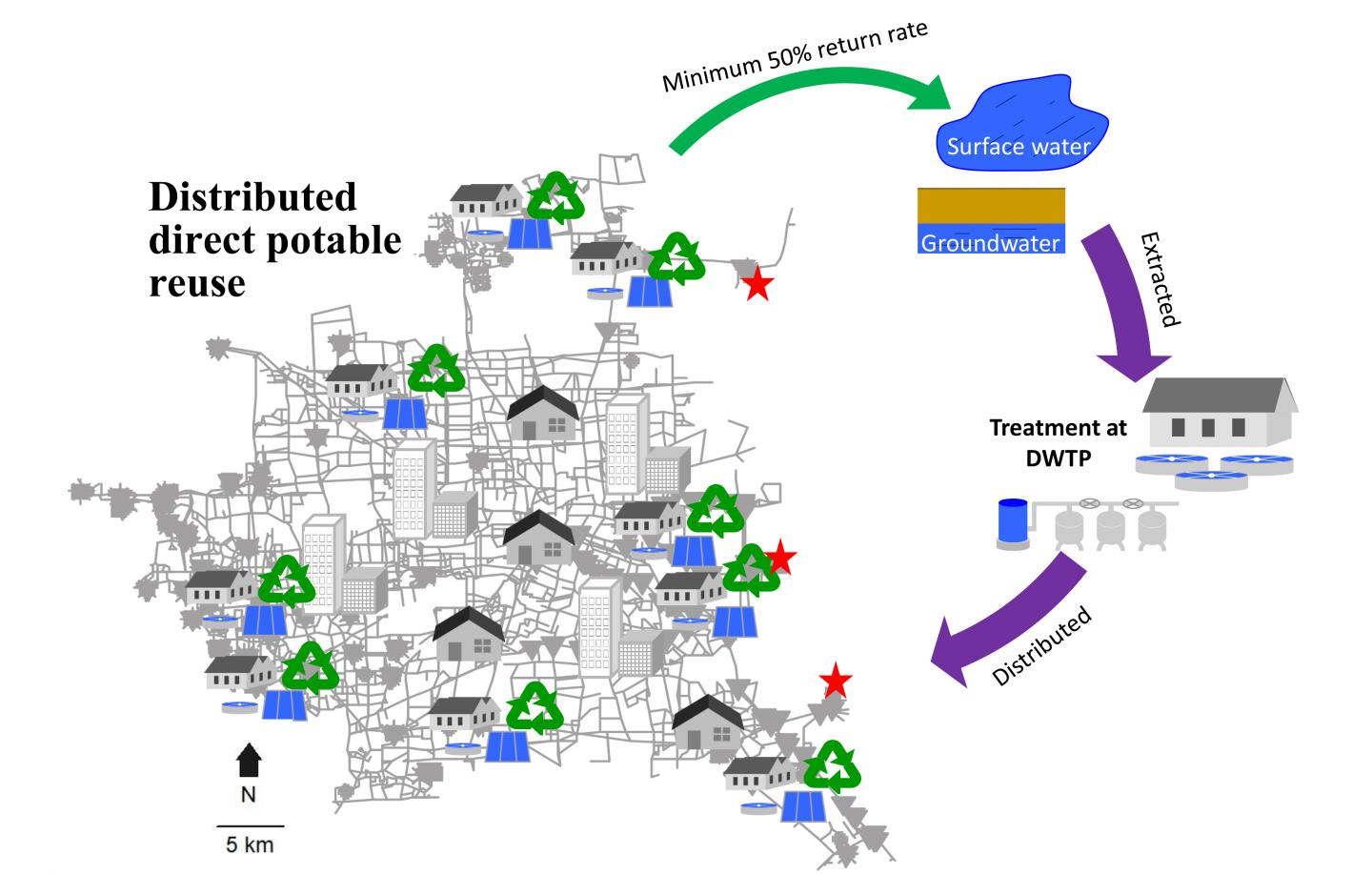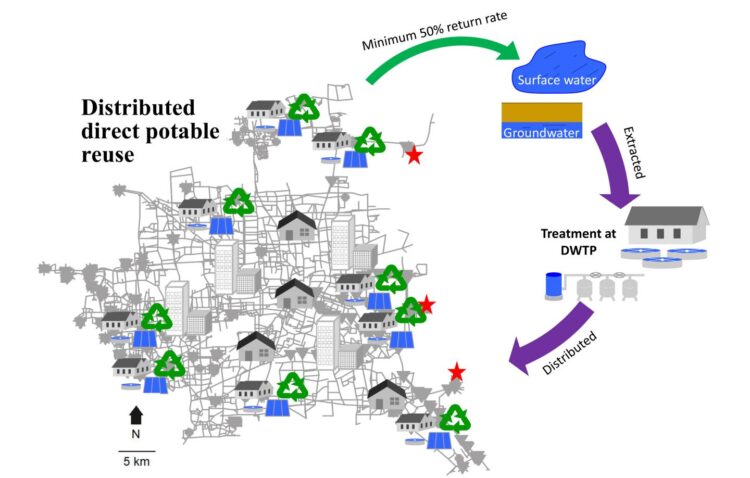Model shows recycling could dramatically slash cities’ need for fresh water resources

Credit: Lu Liu/Rice University
HOUSTON – (April 27, 2020) – Delivering water to city dwellers can become far more efficient, according to Rice University researchers who say it should involve a healthy level of recycled wastewater.
Using Houston as a model, researchers at Rice’s Brown School of Engineering have developed a plan that could reduce the need for surface water (from rivers, reservoirs or wells) by 28% by recycling wastewater to make it drinkable once again.
While the cost of energy needed for future advanced purification systems would be significant, they say the savings realized by supplementing fresh water shipped from a distance with the “direct potable reuse” of municipal wastewater would more than make up for the expense.
And the water would be better to boot.
A comprehensive model of the environmental and economic impact and benefits of such a system was developed by Rice researchers associated with the National Science Foundation-backed Nanosystems Engineering Research Center for Nanotechnology-Enabled Water Treatment (NEWT).
Rice environmental engineer Qilin Li is corresponding author and postdoctoral research Lu Liu lead author of the study that appears in Nature Sustainability.
It shows how Houston’s planned reconfiguration of its current wastewater treatment system, by which it will eventually consolidate the number of treatment plants from 39 to 12, can be enhanced to “future-proof” water distribution in the city.
“All the technologies needed to treat wastewater to drinking water quality are available,” Li said. “The issue is that today, they’re still pretty expensive. So a very important part of the paper is to look at how cheap the technology needs to become in order for the whole thing to make sense financially and energy-wise.”
Advanced water treatment happens to be a subject of intense study by scientists and engineers at the many institutions, including Rice, associated with NEWT.
“Another way to improve potable water would be to cut its travel time,” she said. Water delivered by a system with many distribution points would pick up fewer chemical and biological contaminants en route. Houston, she noted, already has well-distributed wastewater treatment, and making that water drinkable would facilitate shorter travel times to homes.
The model shows there will always be a tradeoff between the acquisition of potable water, the energy required to treat it, the cost of transporting it without affecting its quality, and attempts to find a reasonable balance between those factors. The study evaluated these conflicting objectives and exhaustively examined all possibilities to find systems that strike a balance.
“Ultimately, we want to know what our next-generation water supply system should look like,” Li said. “How does the scale of the system affect distribution? Should it be one gigantic, centralized water source or several smaller distributed sources?
“In that case, how many sources should there be, how big of an area should each supply and where should they be located? These are all questions we are studying,” she said. “A lot of people have talked about this, but very little quantitative work has been done to show the numbers.”
Li admitted Houston may not be the most representative of major municipal infrastructure systems because the city’s wastewater system is already highly distributed, but its water supply system is not. The challenge of having a highly centralized water supply was demonstrated by a dramatic 96-inch water main break this February that cut off much of the city’s supply.
“That was an extraordinary example, but there are many small leaks that go undetected underground that potentially allow contaminants into homes,” she said.
The study only looked at direct potable reuse, which the model shows as a more economic option for established cities, but she said the best option for a new development — that is, building a distribution system for the first time — may be to have separate delivery of potable and nonpotable water.
“That would be prohibitive cost-wise in a place like Houston, but it would be cheaper for a new community, where wastewater effluent can be minimally treated, not quite drinkable but sufficient for irrigation or flushing toilets,” Li said.
“Though maybe it would be to Houston’s advantage to use detention ponds that already exist throughout the city to store stormwater and treat it for nonpotable use.”
###
Li is a professor of civil and environmental engineering, materials science and nanoengineering and chemical and biomolecular engineering. Co-authors of the paper are Rice alumnus Evan Lopez; Leonardo Dueñas-Osorio, an associate professor of civil and environmental engineering; Lauren Stadler, an assistant professor of civil and environmental engineering; Pedro Alvarez, the George R. Brown Professor of Civil and Environmental Engineering and a professor of chemistry and of chemical and biomolecular engineering and director of NEWT; and Yuefeng Xie, a professor of environmental engineering at Penn State University and an adjunct chair professor at Tsinghua University, China.
The National Science Foundation and the National Natural Science Foundation of China supported the research.
Read the abstract at https:/
This news release can be found online at https:/
Follow Rice News and Media Relations via Twitter @RiceUNews
Related materials:
Qilin Li Research Group: http://qilinli.
Department of Civil and Environmental Engineering: https:/
George R. Brown School of Engineering: https:/
Image for download:
https:/
A schematic representation of the hybrid water supply system developed by engineers at Rice University. The researchers suggest that delivering water to city dwellers can become far more efficient, and that it should involve a healthy level of recycled wastewater. (Credit: Lu Liu/Rice University)
Located on a 300-acre forested campus in Houston, Rice University is consistently ranked among the nation’s top 20 universities by U.S. News & World Report. Rice has highly respected schools of Architecture, Business, Continuing Studies, Engineering, Humanities, Music, Natural Sciences and Social Sciences and is home to the Baker Institute for Public Policy. With 3,962 undergraduates and 3,027 graduate students, Rice’s undergraduate student-to-faculty ratio is just under 6-to-1. Its residential college system builds close-knit communities and lifelong friendships, just one reason why Rice is ranked No. 1 for lots of race/class interaction and No. 4 for quality of life by the Princeton Review. Rice is also rated as a best value among private universities by Kiplinger’s Personal Finance.
Media Contact
Mike Williams
[email protected]
Original Source
https:/
Related Journal Article
http://dx.





